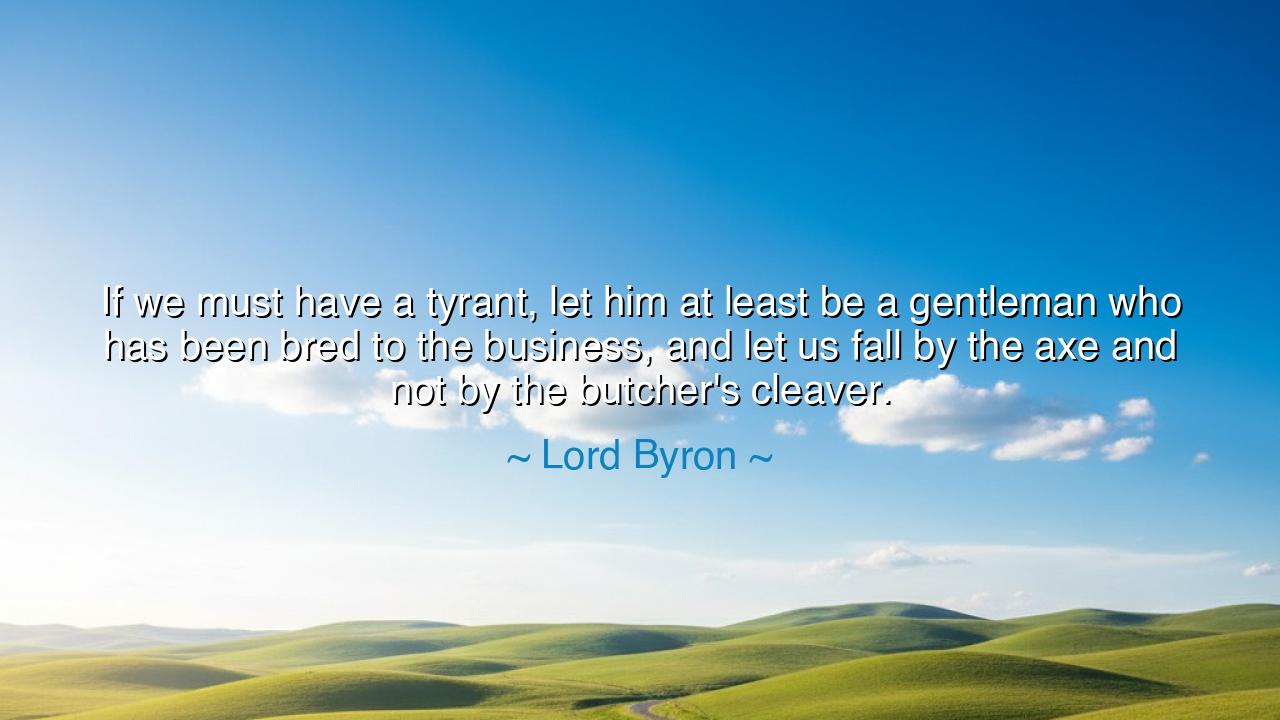
If we must have a tyrant, let him at least be a gentleman who has
If we must have a tyrant, let him at least be a gentleman who has been bred to the business, and let us fall by the axe and not by the butcher's cleaver.






Host: The room feels quiet, the soft glow of the lamp casting a warm, reflective light across the space. Outside, the world has quieted down, setting the perfect tone for a conversation about leadership, power, and the nature of tyranny. Jeeny sits on the couch, her legs tucked beneath her, a cup of tea resting in her hands. Jack, standing by the window, looks out at the darkened world outside, clearly deep in thought.
Jeeny: “Jack, I came across a quote from Lord Byron today that made me think about power and authority,” she says softly. “He said, ‘If we must have a tyrant, let him at least be a gentleman who has been bred to the business, and let us fall by the axe and not by the butcher's cleaver.’ What do you think about that?”
Jack: He turns slowly, a thoughtful expression crossing his face. “It’s a provocative statement, isn’t it? Byron seems to be suggesting that if we’re to be ruled by someone with absolute power, then at least let that ruler be someone who understands the responsibilities of leadership, someone who has been trained and prepared for the role. A tyrant who exercises power with some degree of dignity and wisdom, even if it’s harsh, might be preferable to one who rules through cruelty and brutality. It’s almost as if he’s saying, ‘If tyranny is unavoidable, then let’s at least have a tyrant who respects the process and executes power with some form of honor.’”
Jeeny: “Exactly. Byron is acknowledging the grim reality of power and rule — that tyrants exist, and sometimes it’s unavoidable. But he’s calling for a certain standard of leadership, even in the most oppressive circumstances. It’s as if he’s saying, ‘If we’re going to suffer under tyranny, let it be from someone who has the wisdom, perhaps even the nobility, to lead, not from someone who rules out of sheer cruelty.’ The ‘axe’ might still be brutal, but at least it’s swift and decisive, while the ‘butcher's cleaver’ represents something far more random and violent.”
Host: The light in the room seems to soften as the conversation deepens. Jeeny speaks with an understanding that even in the face of tyranny, there is a desire for order, structure, and dignity. Jack stands still, reflecting on how this quote touches on the nature of leadership and the fine line between harsh authority and cruel, senseless violence.
Jack: “It’s interesting because Byron is almost questioning the morality of leadership itself. He’s asking if we’re going to be ruled, then why not have a ruler who is educated in the ways of power, someone who knows the consequences of their actions and carries the burden of leadership seriously. It’s almost a resignation — a recognition that absolute power will often corrupt, but if we must be governed by someone who holds such power, let it be someone who at least does it with some sense of responsibility.”
Jeeny: “Yes! It’s about order versus chaos, really. Even when it’s harsh, order is something we can understand, something we can live by. But when a tyrant is simply cruel for the sake of cruelty, it breaks down any sense of trust or stability. Byron seems to be saying that a gentleman tyrant, even if they are oppressive, still carries a sense of civility, a respect for the law, and maybe even the lives of those they rule. The butcher’s cleaver, on the other hand, is chaotic, and it’s unpredictable.”
Host: The conversation deepens as they reflect on the nature of leadership and the human tendency to yearn for some form of order, even under oppressive circumstances. Jeeny and Jack both agree that Byron’s words reveal a deep ambivalence about the nature of power — that while tyranny may be inevitable in some cases, there is a call for a leader who governs with structure and dignity, not one who rules through pure cruelty.
Jack: “It also makes me think about how we often romanticize leaders who are strong, decisive, or powerful, but we forget that leadership can still be responsible. A tyrant who has been ‘bred to the business,’ as Byron puts it, is someone who understands what it takes to rule, even if their methods are harsh. We often look for strength in leadership, but that strength needs to be balanced with wisdom, and it’s something we often overlook when we only focus on power.”
Jeeny: “Exactly. It’s about balance — the ability to lead with strength but also with dignity. A leader, even a tyrant, should not just wield power for power’s sake. There has to be a structure, a reason behind the decisions they make. Byron’s quote seems to be a critique of the senselessness of unchecked power and a call for a more responsible, perhaps more even-handed approach to leadership, even when it’s in the hands of someone with absolute authority.”
Host: The room feels quieter now, as if the weight of their conversation has settled into something deeper. Jeeny and Jack reflect on the complexity of leadership, tyranny, and the human need for order, even when that order is harsh. Lord Byron’s words serve as a reminder that even in oppressive circumstances, there is a desire for a leader who governs with wisdom, responsibility, and a sense of structure, rather than one who rules through sheer cruelty and chaos. Leadership, whether fair or unjust, carries the burden of maintaining stability — and even in the worst of times, some measure of dignity is preferable to mindless brutality.






AAdministratorAdministrator
Welcome, honored guests. Please leave a comment, we will respond soon